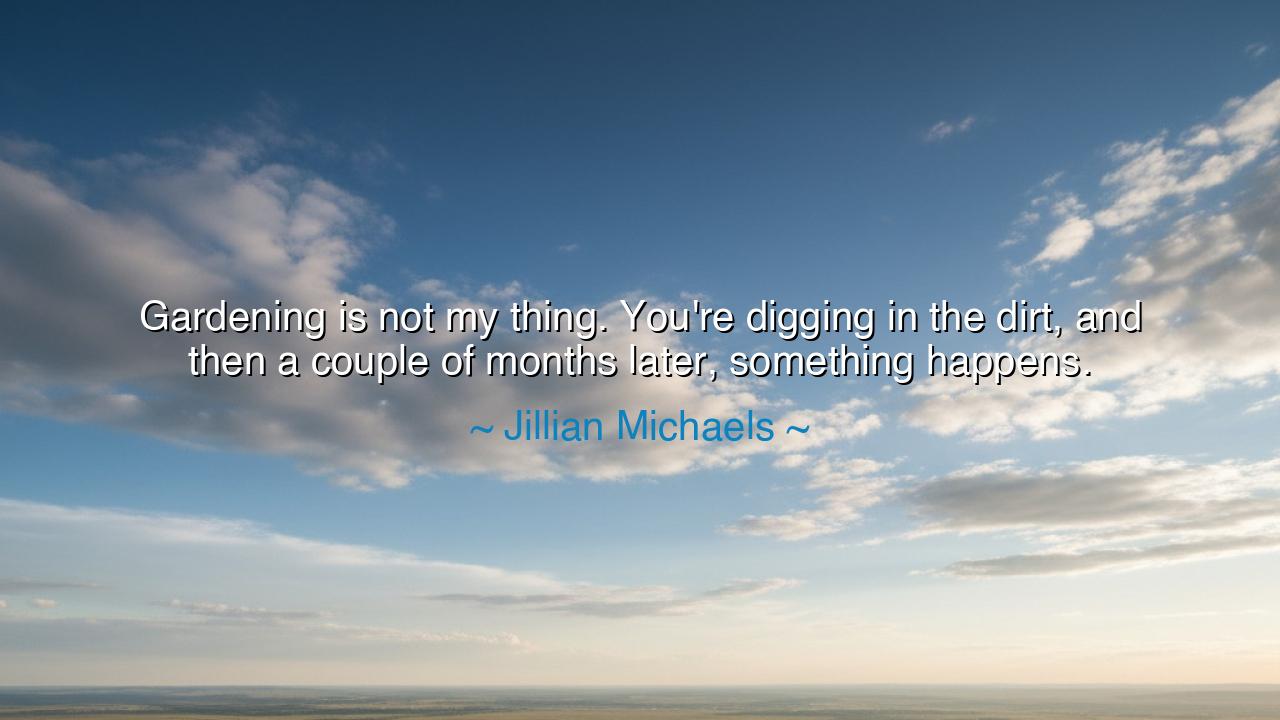
Gardening is not my thing. You're digging in the dirt, and then a
Gardening is not my thing. You're digging in the dirt, and then a couple of months later, something happens.






In the silent dance between man and earth, there exists a truth that the wise have always understood: that growth does not happen overnight, nor does it come through haste or force. Jillian Michaels, in her candid reflection, states, “Gardening is not my thing. You’re digging in the dirt, and then a couple of months later, something happens.” These words reveal a deeper understanding of the natural rhythm of life—the way that, though the seeds of effort are often planted in soil that seems barren, transformation is always underway, slow and imperceptible, until it finally comes to light. It is in the quiet patience of the garden that we are taught the most profound lessons of life: the value of perseverance, the beauty of waiting, and the sacred dance between work and reward.
In the ancient world, those who labored the land understood this profound truth. Agriculture was not just the work of the hands, but of the spirit. The ancient Egyptians, for instance, revered their land as the very gift of the gods. They understood that, just as the Nile would flood and recede in its own time, so too did the earth reveal its bounty. The farmers would work the soil, plant their seeds, and wait, knowing that it was the land’s rhythm that guided them. In this way, the gardener is not simply a worker, but a humble partner with the earth, a collaborator in a process much greater than any individual effort. The slow germination of a seed, like the unfolding of the soul, cannot be rushed or forced; it is a natural process that happens in its own time.
Jillian Michaels, though she may not find joy in gardening, speaks to something universal in her statement. The act of digging in the dirt, of sowing seeds, is an ancient metaphor for effort without immediate gratification. How many of us, in our pursuit of success, feel the pull of impatience? How often do we seek quick results, eager for the fruit before the tree has had time to bear it? Gardening teaches us a powerful lesson: that patience is not just a virtue, but a necessity. It is in the act of waiting, in tending the soil and nurturing the plants, that we learn the deep rhythms of the universe—that all things have their own time to bloom.
Consider the story of Socrates, the ancient philosopher who, though he lived amidst the great minds of Athens, often spoke of the importance of simple, humble tasks in achieving wisdom. He, too, understood that growth takes time and cannot be rushed. Socrates never sought to dominate nature or rush its process. He taught that the path to true understanding was not one of force, but of quiet reflection, of patience in the face of challenge. Just as the gardener waits for the seasons to change, so too did Socrates urge his students to wait for the moment of clarity and insight to reveal itself, naturally and without haste.
Even the great Buddha, upon his journey to enlightenment, was reminded that patience is an essential part of spiritual growth. Under the Bodhi tree, he sat for days, enduring the pain of hunger and temptation, learning that true transformation comes not from external circumstances, but from inner perseverance. The seed of wisdom, like that of the garden, takes time to germinate. Buddha’s enlightenment did not come through rushing, but through surrendering to the natural unfolding of his own journey—just as the gardener surrenders to the process of the earth’s cycle, understanding that time, not willpower, is the true guide.
In this context, Jillian Michaels’ statement serves as a reminder of our modern disconnect with the natural world and its rhythms. We are often impatient, desiring instant results in a world that values speed over slow, steady growth. Yet, the ancients teach us that true wisdom and progress come not from the quick fix, but from the patient work of daily effort, the steady nurturing of small things until they eventually bloom into something profound. Whether we are tending a garden or working on a personal goal, the lesson is the same: success is not won through haste, but through consistent and thoughtful action over time.
So, take the wisdom of gardening to heart. Understand that the seeds you plant today may take months—or even years—to bear fruit. But trust that, as you tend to your dreams, your efforts are never wasted. The earth, like life, will return to you what you sow, but only if you are patient enough to wait for it. If gardening is not your thing, take that truth and apply it to the work that is yours—whether it be in your career, relationships, or personal growth. Remember that, though it may seem as if you are digging in the dirt, one day you will look up, and something beautiful will emerge, nurtured by the time and effort you have so humbly given. In this way, all things grow, and all things unfold in their own perfect time.






AAdministratorAdministrator
Welcome, honored guests. Please leave a comment, we will respond soon